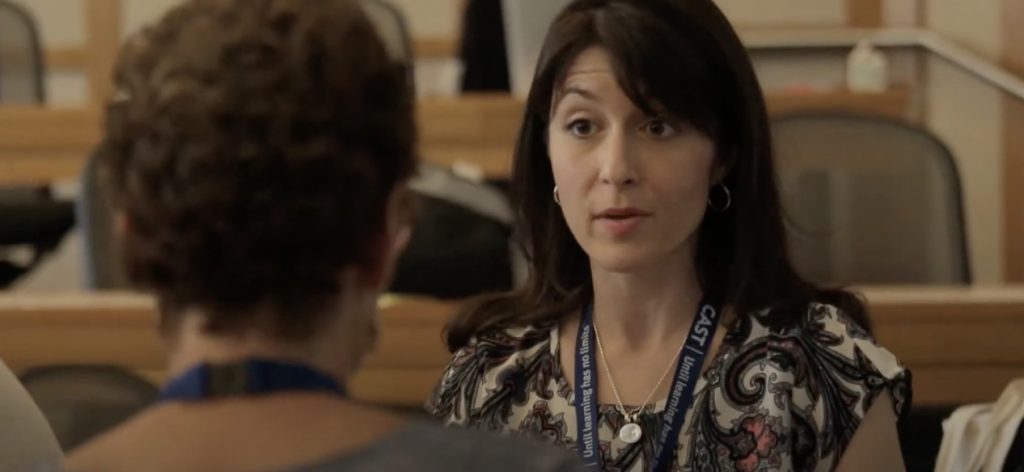The 9th annual CAST UDL Symposium, held July 31–August 1, 2023, focused on exploring strategies to make Universal Design for Learning a common and prevalent practice in education.
Bringing together educators and learning experts, it was an opportunity to take a deeper dive into UDL and complementary frameworks like community building and empowerment to improve learning across professional development and higher education ecosystems.
As a sponsor for the event, we were excited to sit in on some great conversations and hear fresh perspectives on continuous improvement, inclusive pedagogy, and more, while sharing a bit of our own mission to deliver inclusive, engaging, and accessible digital-enabled learning experiences for all.
Conference highlights

- Unpacking Nicole Tucker-Smith’s keynote speech on cultivating brave spaces by designing from diverse perspectives
- Discovering the concept of the science of hope and how it impacts learning from Cathleen Stocktill-Beachboard
- Participating in a continuous improvement activity with Alia Latorre
- Digesting Humberto Hernandez’s insights into inclusive pedagogies
Takeaways from the 9th annual CAST UDL Symposium 2023
Diversity and intersectionality collectively drive change and innovation.
Nicole Tucker-Smith set the scene with a powerful keynote speech on designing from diverse perspectives, noting that the power of intersectionality is required to solve problems on a large scale. Among her references was a study showing the impact of diversity on the scientific community and how it resulted in improved problem-solving, specialization, objectivity, and more.
To conclude her speech, Nicole shared some concrete ideas about how to design learning environments free from limits:
- We embrace and showcase learner variability when we give learners a wide range of options, including aspirational ones.
- Diverse strategies make learning more effective. Consider storytelling, holistic thinking, systems approach, and analogies.
- Be proactive in setting learning outcomes, and ensure the design of your learning programs empowers participants to meet them. Designing for learner variability takes into account individual and cultural characteristics.
Learners thrive when we prioritize their strengths.
Cathleen Stocktill-Beachboard’s session was centred around the science of hope and how it impacts learning. In particular, she focused on positive framing: Learning shouldn’t be something to endure; rather, it should be a positive experience that empowers learners to enhance their capabilities and gain confidence in their learning journeys.
Cathleen highlighted that the onus for learning is not just on the learner—education and training experts can do a lot to set learners up for success. In order to make learning more effective, she suggested strategies like enabling reflection, feedback, and goal setting, as well as:
- making the subject matter relatable to the learner’s perspective and objectives
- providing additional resources and a community of practice to give learners a path forward when they run into challenges
- empowering learners with agency and choice so they can take ownership of their learning journey
Continuous improvement is a key ingredient to successful learning programs.
Whether you’re running onboarding programs or employee training, continuous improvement in learning and development can be a valuable practice in building learning tools and pathways to help learners bridge theory to practice.
But how do you implement continuous improvement and ensure your learning programs continue to meet the desired levels of impact across the organization?
In a continuous improvement activity with Alia Latorre, we practiced answering three questions to assess and drive continuous improvement:
- What problem are we trying to solve?
- What change might we introduce and why?
- How will we know that a change is actually an improvement?
There’s more to inclusive training than accommodations.
In his talk about facilitating inclusive teaching, Humberto Hernandez pointed out the barriers disenfranchised learners experience in programs across the United States.
For instance, the term “inclusivity” is often associated with accommodations and “making room” for others, but it’s more than that. Inclusivity, especially in learning environments, involves welcoming users through language, design, and engagement. We can achieve this outcome through a deliberate and proactive process that not only designs for but also designs with diverse users.
Another barrier is that learning programs are mostly facilitated by subject matter experts who have limited experience in instructional design and learning science, and therefore can face challenges in applying inclusive practices in a learning environment.
The solution to these barriers mirrors our approach to course design, which includes:
- challenging traditional methods of learning by reviewing educational foundations and processes
- bringing subject matter experts and learning experts together to combine their expertise in building effective learning programs
- making digital learning environments more human by including options to engage with other learners and providing opportunities for learners to apply and contextualize courses in relation to their work and lives
The CAST UDL Symposium 2023 was an excellent opportunity to explore UDL best practices and other evidence-based frameworks that empower learners to move from theory to practice.
We look forward to next year’s symposium and the chance to connect with more of you as we continue to work to advance the goals of UDL.
Interested in learning more about how UDL can help you reach your organization’s training goals?
Over the years, we have set new standards of learning through projects that prioritize the UDL principles of Engagement, Representation, and Action and Expression.
Learn how we helped George Brown College build UDL capacity at scale across Ontario institutions.